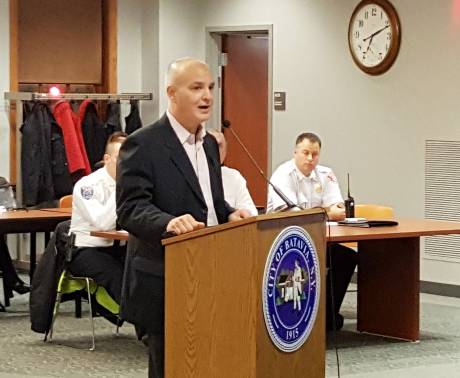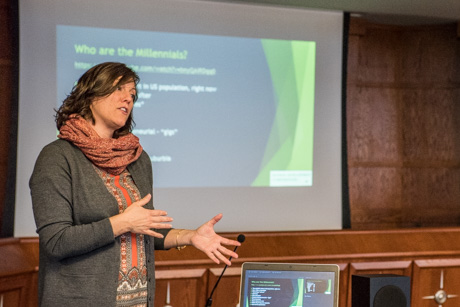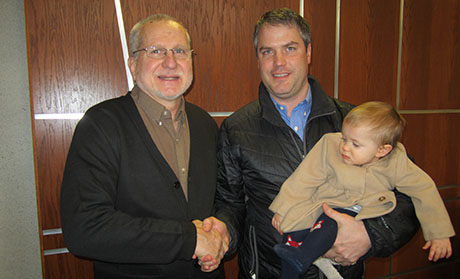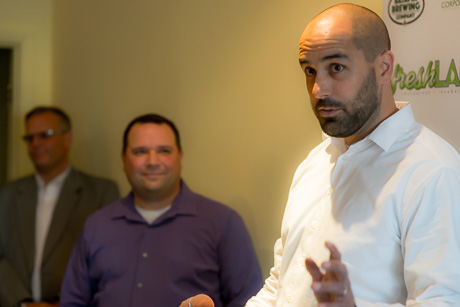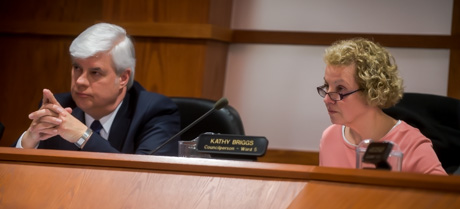City Council tonight (Oct. 11) unanimously passed a resolution supporting the redevelopment of Ellicott Station, a move that officials of the Batavia Development Corp. hope spurs Empire State Development to act favorably and quickly on the BDC's request for $2.4 million in grant funding for the project.
"We intend to send this resolution to the agencies (ESD and Finger Lakes Regional Economic Development Council) to show more support and solidarity," BDC Coordinator Julie Pacatte said.
Pacatte was referring to the collaboration among the City of Batavia, Genesee County, Batavia City School District and Genesee County Economic Development Center, which joined together to commit a percentage of payments in lieu of taxes (PILOTS) to a unique program known as Batavia Pathway to Prosperity.
BPP and anticipated capital grants from the ESD -- $1.9 million through the Consolidated Funding Application and another $500,000 from Restore NY -- have paved the way for Savarino Companies of Buffalo to commit to investing millions of dollars into turning the former Santy's Tire Sales and Soccio & Della Penna construction firm site on Ellicott Street into a vibrant entertainment/office/apartment complex.
The resolution is meant to "reiterate the importance of this $17 million investment in a highly distressed area of the city experiencing 32 percent poverty and nearly 7 percent unemployment," Pacatte said. "We urge New York State to enable us to implement the plan in which they sponsored."
The Ellicott Station project is listed as a Five-Year Pipeline Initiative by the FLREDC within its 2016 progress report and recommended priority projects, which focus on mixed-use development, poverty levels and leveraging private investment.
Pier Cipollone, a BDC board member and former City Councilman, said that "closing the gap" in funding by obtaining these grants must happen before Savarino Companies can put its plan into action.
"If we can get moving on this, then we can turn some of these other sites around," he said, noting that the BDC has identified four other areas in the city (City Centre Mall, United Memorial Medical Center/YMCA corridor, Creek Park behind Falleti Ice Arena and the Harvester Center) for redevelopment.
The four-page resolution traces the city's now seven-year effort to revitalize Batavia's Brownfield Opportunity Area. It emphasizes that both of these grants are "necessary to advance the Phase I component (envirnmental assessment, cleanup, engineering costs, etc.) of the Ellicott Station project and will be matched by substantial private equity investment and significant local resources through the BPP program."
City Manager Jason Molino said that Savarino Companies will be responsible for about 70 percent of the project's total cost.
Pacatte, in a memo to Molino, wrote that Ellicott Station will create arouind 145 temporary construction jobs in which Savarino has committed to hiring some local unemployed workers. When finished, she noted, the project should result in 160 permanent jobs earning $6 million annually, while generating $500,000 in downtown consumer retail demand and $335,000 in sales tax annually.
She added that total assessed value will increase thirtyfold, and that values of properties within a half mile will improve by 10 to 15 percent.
Pacatte said that Savarino Companies has lined up some tenants and prospects, and she expects an announcement to be made in the near future.
In other developments, Council:
-- Received word from Molino that the city was one of 76 municipalities to receive an "Operation Keep Our Home" grant available through a settlement by the state's Attorney General. Municipalities with at least 5,000 people and a minimum of 100 vacant homes were eligible for the program.
Molino said the $66,500 award will be used to combat "zombie" and vacant properties along several fronts -- the use of foreclosure prevention counselors, hiring an MBA graduate assistant to collect data on vacant homes in the city, working with agencies such as Habitat for Humanity, marketing, purchase of computer and software to keep track of properties, and to revise city codes relating to neighborhoods.
-- Authorized eight transfers from the city's assigned fund balance to the following dedicated reserve funds for future purchases, renovations, repairs and obligations -- police capital equipment, fire capital equipment, public works capital equipment, Dwyer Stadium, public facilities capital, capital sidewalk reconstruction, administrative services equipment and software, and employee benefit accrued liability.
-- Approved an agreement with Wells Fargo that allows the city to hire a contractor to demolish the single-family residence at 23 Columbia Ave., which has been vacant for quite some time and has numerous code violations, and then receive reimbursement from Wells Fargo for all costs associatied with the demolition (estimated to be around $25,000).
"Preferably we would like them (banks) to demolish these types of homes rather than us, but in this instance this may be quicker," Molino said.
Molino said the condemed property on Columbia Avenue is "outside the ordinary" and this method could be used again to put pressure on lending institutions to meet their responsibilities.
-- Extended a contract with Environmental Solutions (U.S.) Ltd. to continue its removal of alum sludge from the Wastewater Treatment Plant off Pearl Street, action that adds $400,000 to the cost but still keeps the project under the original budgeted amount of $2.1 million.
-- Approved, by a 7-1 count, with Rose Mary Christian dissenting, a resolution to submit a request for a NYS Department of Transportation grant to construct sidewalks, high-visibility crosswalks and handicapped ramps in the areas of UMMC, downtown, Batavia school properties, NYS School for the Blind and Austin, Centennial and MacArthur parks. Council agreed to pay 25 percent (5 percent more than required) of the cost to better its chances of receiving funding.
Christian said she voted against it because the proposal did not include funding for any sidewalks in her Sixth Ward.
-- Voted in favor of a lease agreement with Dent Neurologic Institute at 35-39 City Centre for 1,122 square feet of space at $16.50 per square foot -- or $1,851.30 per month -- for a year, with two six-month renewal options.
Molino said the lease agreement would act as a "placeholder until we have an idea of bigger development of the mall."
Dent is using about a fourth of the total space at 35-39 City Centre, which recently was foreclosed upon by the city due to delinquent property taxes. Molino said Dent's lease payments will cover all of the city's costs related to taxes, insurances and maintenance of the property.


